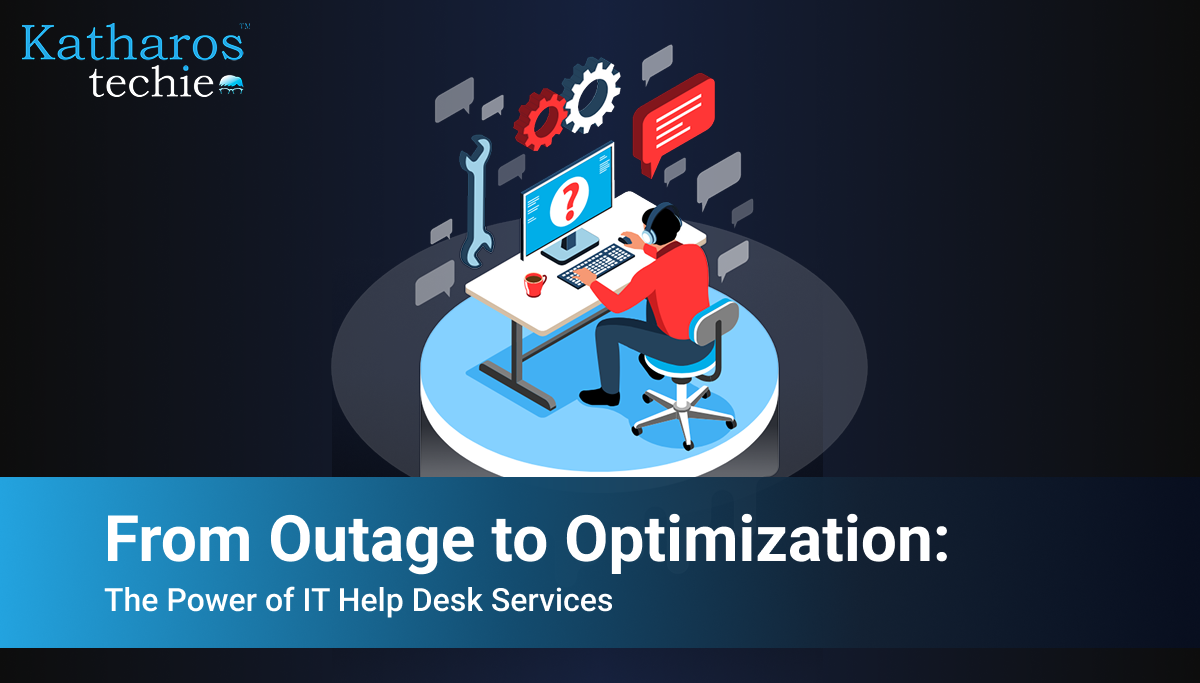
From Outage to Optimization: The Power of IT Help Desk Services
By Gauri Kulkarni

Every business has its uh-oh moments—the dreaded frozen screen during a client call, a printer that stops working 10 minutes before the presentation, or worse, a full-blown system crash on a Monday morning. In a world where we rely on technology for virtually everything, a tech failure can seem like the end of the world.
But they don’t have to be. That is where IT help desk services come in.
These unsung heroes operate behind the scenes to make sure your company doesn’t stop when tech problems arise (and they will). This applies regardless of whether your company is a start-up operating on a lean budget or an established enterprise with numerous moving components. The right IT support system can help you turn anarchy into calm and downtime into uptime.
Let’s examine why it is not only wise but also necessary to invest in remote IT support and business IT troubleshooting.
The Role of IT Help Desk Services in Modern Business
The digital workplace is evolving. Employees now work from home offices, coffee shops, airports, and coworking spaces instead of just one office. As a result of this change, providing tech support to employees has become more complicated and important than it was previously.
That vital first line of defense is provided by IT help desk services. They serve as the primary resource for troubleshooting issues, ranging from server malfunctions to password resets. More than that, though, a good help desk uses proactive maintenance, system monitoring, and user training to stop many problems before they start.
Think of your company as a race car. The drivers are your employees. The help desk? They serve as the pit crew, keeping everything in working order, promptly resolving issues, and making sure your crew members continue to compete.
The True Cost of Downtime

Downtime doesn’t just stop work—it chips away at your business in multiple ways. Here’s how:
- Direct Financial Loss:
Businesses can lose up upto ₹4.5 lakh per minute (roughly $5600 worldwide) due to IT outages. Depending on the industry, even small businesses can lose between ₹10,000 and ₹50,000 per hour.
- Lost Productivity:
When systems are unavailable, employees are unable to perform their duties. Team productivity is directly impacted by delays in emails, file access, or necessary tools.
3. Employee Frustration:
If there is no immediate fix for recurring technical problems, employees may become stressed, frustrated, or even experience burnout.
4. Missed Business Opportunities:
Missed client meetings, hiccups during sales pitches, or delayed service delivery can lead to strained relationships or lost business.
5. Cost of Emergency Fixes:
You may have to pay more for last-minute, urgent tech fixes if there isn’t a dedicated help desk.
6. Security Risks:
Data loss, problems with compliance, and harm to one’s reputation can arise from downtime caused by malware or cyberattacks.
Why Remote IT is a Must-Have:

- Shift in Work Culture:
The way we work has fundamentally changed. Remote and hybrid work setups are no longer the exceptions—they’re standard practice across industries. Now, teams are dispersed throughout cities, time zones, and occasionally even nations. This shift has made seamless, efficient tech support not just important, but essential for keeping daily operations running smoothly.
Also read: https://katharostechie.in/remote-work-technologies-revolutionizing-the-future-of-work/
- What Remote IT Support Offers:
Remote IT speed offers speed and flexibility, allowing IT teams to diagnose and fix issues quickly without on-site visits. Many providers offer 24/7 support, allowing businesses to receive immediate assistance when needed.
- Benefits of Remote Support:
The benefits go beyond convenience. Remote IT support drastically reduces wait times and downtime, getting workers back to work faster. Providing consistent help regardless of staff location is crucial in a distributed work environment. Businesses save money and better allocate resources by eliminating the need for in-house IT teams to handle routine issues.
Remote IT support isn’t merely a contingency plan; it is an essential function in the modern workplace, where uptime and agility are crucial. Strong IT support services for remote teams allow workers to work with confidence from any location because they know that dependable tech support is only a phone call or click away. In the end, this degree of accessibility and responsiveness keeps companies safe, effective, and prepared for the future.
What Makes the Best IT Help Desk Provider?
- Responsiveness:
Speed is important when technical issues arise. The top help desk providers minimize the impact on your operations by providing prompt resolutions and response times. Your company will experience less downtime the sooner your team receives assistance, whether it is for a password reset or a crashed server.
- Scalability
As your business develops, so will your IT requirements. Thus, adaptability is essential. Great providers do more than simply solve your current issues; they grow with you, providing sophisticated monitoring tools, add-on services, and support for new systems as your business grows.
- Remote Capabilities:
The ability to troubleshoot remotely is now a must. You should have a help desk that can help with VPNs, cloud apps, remote desktops, and more, regardless of whether your team is working from home, the office, or halfway around the world. One significant advantage is the ability to support distributed and hybrid teams with ease.
- Security Expertise:
The top help desks safeguard your infrastructure in addition to correcting errors. A good provider will help you stay in compliance with data protection standards, educate your team about phishing, and provide proactive security patches in light of the growing threat of cyberattacks.
- Human-Centric Communication:
Not everyone is proficient in “tech.” Strong communication abilities are therefore important. Seek out a supplier who avoids jargon, explains solutions in plain language, and shows your team professionalism and patience. Tech support ought to be more like a collaboration than a lecture.
Real-Life Scenario: Downtime Averted
- The Situation:
A burgeoning marketing firm was using Zoom to prepare for a significant client pitch. The lead presenter’s software crashed completely just minutes before the call. As the clock ticked down, panic broke out.
- The Solution:
Fortunately, remote IT support was available to the agency. A technician remotely accessed the system, identified the issue, and assisted the user with a reset within three minutes of calling the help desk. The client didn’t even notice a problem, and the meeting started on schedule.
- The Outcome:
There were no lost sales, no delays, and no harm to the client relationship. With the proper support system in place, the team was able to avoid a potentially humiliating setback. This actual case demonstrates how prompt, attentive IT support can prevent a crisis and preserve your company’s reputation.
From Outage to Optimization: The Bigger Picture
These real-world instances demonstrate the importance of responsive IT support, not only for saving the day but also for making sure your company is always progressing. The effects of excellent IT help desk services are extensive and long-lasting, whether they are used to stop financial losses, assist remote teams, or keep workers stress-free.
Final Thoughts: Turn Tech Trouble into Tech Triumph
Although IT problems are inevitable in business, they don’t have to stop advancement. Businesses can enhance departmental productivity, support remote and hybrid teams, and stay ahead of disruptions with the correct IT help desk services. Selecting a provider that meets your needs—one that offers scalable plans, robust security, quick response times, and transparent, human-focused communication—is crucial. Therefore, now is the time to invest in a solution that offers stability, speed, and uptime if you’re sick of lost time, irate staff, and preventable technical problems. After all, the objective is to create a system that supports the success of your team, not just to solve issues.